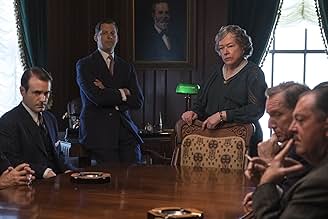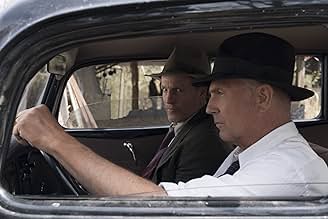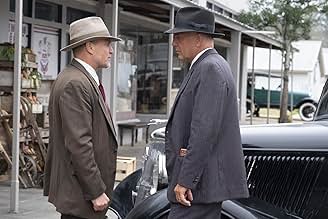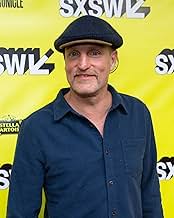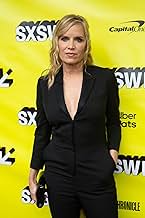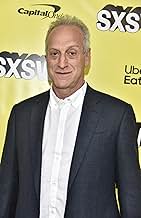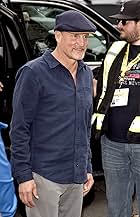Due spietati ex Texas Ranger devono scovare e assassinare i famigerati criminali Bonnie e Clyde.Due spietati ex Texas Ranger devono scovare e assassinare i famigerati criminali Bonnie e Clyde.Due spietati ex Texas Ranger devono scovare e assassinare i famigerati criminali Bonnie e Clyde.
- Regia
- Sceneggiatura
- Star
- Premi
- 3 candidature totali
Josh Caras
- Wade McNabb
- (as Joshua Caras)
Recensioni in evidenza
This is the True story of 2 Texas Rangers who both came out of retirement to hunt down the notorious Bonnie and Clyde. Frank Hamer (Costner) and Maney Gault (Harrelson) team up and hit the road after being hired by Texas Governor Ma Ferguson(Bates) and the Prison Warden(J K Lynch) from where Barrow escaped.
Bonnie Parker and Clyde Barrow were as famous as Movie Stars back in the 1930's and this is effectively portrayed especially at the end. Costner and Harrelson pairing works well and though maybe a bit long the Movie does its Job and so did the Bullets!
This is an extremely well put together, engaging and entertaining telling of the pursuit of Bonnie and Clyde. Woody Harrelson is at the top of his form. He's played the part of the hardbitten lawman before, but it keeps getting better. And Costner does almost as well. The interplay is absorbing and extremely well written and acted.
In western culture we love our bandit myths and legends, which for some reasons celebrate some fairly nasty characters. Knowing the real story of Bonnie and Clyde, as opposed to the myth created by the contemporary news media and J. Edgar Hoover, always made Arthur Penns near worshipful portrayal of these two blood drenched spree murderers jarring. Bonnie and Clyde were bloodthirsty sociopaths, who in fact ambushed and murdered a fair number of people, including shooting unarmed store clerks in the back. Bonnie and Clyde were not "sticking it to the man" robbing big business like banks as much as they were in fact robbing and killing owners of small stores and then committing cold blooded murder of policemen trying to stop the mass murder spree.
The ultimate "ambush" of Bonnie and Clyde was not some planned execution, it was the result of the simple fact that those two had, withing seconds of being stopped, routinely murdered police who stopped them. They also did most of their murders with simple revolvers and sawed off shotguns, and almost none of the guns used were machine guns (a documented invention of Hoover's FBI; of the twenty or so people Bonnie and Clyde shot exactly one was shot with a machine gun). Hoover was fixated on above all else a) trying to prove that his agency's high tech of the time was the best avenue, despite all evidence to the contrary, b) distracting from, even to the point of denying the existence of, organized crime that Prohibition he supported had created. Hence his spinning of "celebrity" criminals like Dillinger and Bonnie and Clyde, which also fit his narrative that we needed a national police force.
In fact FBI in fact made a mess out of their pursuit of Bonnie and Clyde, and it was old fashioned policing by two standard state lawmen that put an end to their violent spree.
So watch this film to see great buddy cop tension, and character interplay. Seriously as good as True Detective level. And a subtle subtext of well done but not over the top critique of Penn's worshipful portrayal of these two hyperviolent criminals in his 1967 film. The bumbling lawmen myth attached to to the 1967 film is also blown away. Bonnie and Clyde's murder and crime spree ranged over an area of 600,000 square miles, and it was old fashioned hard-bitten police work that got them.
Lastly the period work is another very well done element. Not just the visual elements, but the the dialogue. Instead of the fictitious Hepburn-Tracy like, now laughable, staccato dialogue of the 1967 film, we get a much more accurate laconic way of speaking at that time. More is said in fewer words between Harrelson and Costner.
Give it a watch, you will not be disappointed, although your prior positive views of the one-dimensional 67 film, may change.
In western culture we love our bandit myths and legends, which for some reasons celebrate some fairly nasty characters. Knowing the real story of Bonnie and Clyde, as opposed to the myth created by the contemporary news media and J. Edgar Hoover, always made Arthur Penns near worshipful portrayal of these two blood drenched spree murderers jarring. Bonnie and Clyde were bloodthirsty sociopaths, who in fact ambushed and murdered a fair number of people, including shooting unarmed store clerks in the back. Bonnie and Clyde were not "sticking it to the man" robbing big business like banks as much as they were in fact robbing and killing owners of small stores and then committing cold blooded murder of policemen trying to stop the mass murder spree.
The ultimate "ambush" of Bonnie and Clyde was not some planned execution, it was the result of the simple fact that those two had, withing seconds of being stopped, routinely murdered police who stopped them. They also did most of their murders with simple revolvers and sawed off shotguns, and almost none of the guns used were machine guns (a documented invention of Hoover's FBI; of the twenty or so people Bonnie and Clyde shot exactly one was shot with a machine gun). Hoover was fixated on above all else a) trying to prove that his agency's high tech of the time was the best avenue, despite all evidence to the contrary, b) distracting from, even to the point of denying the existence of, organized crime that Prohibition he supported had created. Hence his spinning of "celebrity" criminals like Dillinger and Bonnie and Clyde, which also fit his narrative that we needed a national police force.
In fact FBI in fact made a mess out of their pursuit of Bonnie and Clyde, and it was old fashioned policing by two standard state lawmen that put an end to their violent spree.
So watch this film to see great buddy cop tension, and character interplay. Seriously as good as True Detective level. And a subtle subtext of well done but not over the top critique of Penn's worshipful portrayal of these two hyperviolent criminals in his 1967 film. The bumbling lawmen myth attached to to the 1967 film is also blown away. Bonnie and Clyde's murder and crime spree ranged over an area of 600,000 square miles, and it was old fashioned hard-bitten police work that got them.
Lastly the period work is another very well done element. Not just the visual elements, but the the dialogue. Instead of the fictitious Hepburn-Tracy like, now laughable, staccato dialogue of the 1967 film, we get a much more accurate laconic way of speaking at that time. More is said in fewer words between Harrelson and Costner.
Give it a watch, you will not be disappointed, although your prior positive views of the one-dimensional 67 film, may change.
We all saw the movie Gangster Story (1967) directed by Arthur Penn. In France, we all heard the eponymous song (Brigitte Bardot and Serge Gainsbourg, 1968). The Highwaymen is a mirror version with two retired Rangers in pursuit of the infamous outlaws Clyde Barrow and Bonnie Parker, considered as Robin Hood and his beloved wife by the plebs. A dead or alive hunt, in the 30's. Knowing that dead is a priori more practical, we suspect from the outset, even if we do not know the story, that it will probably be the chosen solution. In many aspects, I perceive the atmosphere of Gli spietati (1992) directed by Clint Eastwood, with its predictable and ineluctable ending, with cars and heavy machine guns instead of horses and Remingtons.
The actors, the photography, the costumes, the cars, the atmosphere of the post-1929 Great Depression, the rhythm, the dialogues, the soundtrack, ... This is an excellent movie! As a synthesis: 8/9 of 10.
The actors, the photography, the costumes, the cars, the atmosphere of the post-1929 Great Depression, the rhythm, the dialogues, the soundtrack, ... This is an excellent movie! As a synthesis: 8/9 of 10.
This story is told from the other perspective that we are used to see. Two aged, recommissioned(or, actually half-recommissioned) Texas Rangers take on Bonny and Clyde and hunt them in the end using same tactics that B&C used to kill lawmen. The tempo is slow at the beginning and builds up gradually until the climax. The sedate style of storytelling is intentional to give it a more realistic feel. The director Mr. Hancock achieves that masterfully! Set-design is excellent! Camerawork follows the happenings from the perspective of Pancho and Manny, and you get a clear idea of what they are facing while dealing with such criminals. There are some intense moments that will keep you on the edges of your seats!
Finally, the acting. Superb! A plus straightaway! The screen chemistry of Costner and Harrelson works like magic, and their banter wont let you feel that you are actually watching a hunting party involving some deep criminals. The last scene is simply impeccable! I'd say its a solid eight-outta-ten!
The cinematography, sets and costumes were all, first rate. It's this kind of attention to detail which sets this movie apart from some others.
Woody Harrelson is the stand-out performer to me, but Costner more than carries his weight. The atmosphere of austerity in the Western States is palpable.
Once again Netflix has nailed it, keep it up guys.
Lo sapevi?
- QuizWhen Texas Ranger Frank Hamer was earlier portrayed by Denver Pyle in Gangster Story (1967), he was characterized as an incompetent fool, prompting his widow Gladys to sue Warner Brothers for defamation of his character. In 1971 an out-of-court settlement was reached.
- BlooperDuring When Frank Hamer's talk with the gas station attendant, the attendant says that Bonnie and Clyde "only rob banks" . While it is true they did rob banks, they actually robbed more stores and gas stations by far.
The station attendant's statement-while factually incorrect-was most likely meant to reflect popular misconceptions that began while Bonnie and Clyde were alive and have persisted to the present day. Due to their less spectacular nature (and generally lower body counts), the Barrow Gang's numerous robberies of gas stations, grocery stores, and assorted small businesses were under-reported at the time, with some not being attributed to the gang until months or even years after they occurred.
- Citazioni
Maney Gault: Clyde might be king, but I'm a Texas Ranger, you little shit.
- Curiosità sui creditiDuring the first part of the closing credits, photos are shown of the real people and scenes portrayed.
- ConnessioniEdited from The George Burns and Gracie Allen Show (1950)
- Colonne sonoreAfraid to Dream
Written by Mack Gordon and Harry Revel
Performed by Benny Goodman and His Orchestra
Courtesy of RCA Records
By arrangement with Sony Music Entertainment
I più visti
Accedi per valutare e creare un elenco di titoli salvati per ottenere consigli personalizzati
Dettagli
- Data di uscita
- Paese di origine
- Sito ufficiale
- Lingue
- Celebre anche come
- The Highwaymen
- Luoghi delle riprese
- Aziende produttrici
- Vedi altri crediti dell’azienda su IMDbPro
Botteghino
- Budget
- 49.000.000 USD (previsto)
- Tempo di esecuzione2 ore 12 minuti
- Colore
- Mix di suoni
- Proporzioni
- 2.39 : 1
Contribuisci a questa pagina
Suggerisci una modifica o aggiungi i contenuti mancanti







